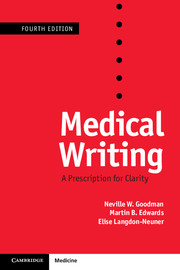Book contents
- Frontmatter
- Dedication
- Epigraph
- Contents
- Foreword
- Preface to the fourth edition
- Layout of the fourth edition
- Preface to the first edition
- Acknowledgements
- Part I Problem: the illness
- Part II Solution: symptomatic relief
- Part III Practice: recuperation
- 23 Exercises
- Appendix British–American English
- References and further reading
- Index
23 - Exercises
Published online by Cambridge University Press: 05 September 2014
- Frontmatter
- Dedication
- Epigraph
- Contents
- Foreword
- Preface to the fourth edition
- Layout of the fourth edition
- Preface to the first edition
- Acknowledgements
- Part I Problem: the illness
- Part II Solution: symptomatic relief
- Part III Practice: recuperation
- 23 Exercises
- Appendix British–American English
- References and further reading
- Index
Summary
Writing improves with practice. This chapter consists of 43 exercises. Directly below are the original exercises with our analyses and revisions. If you want to work through the untouched, original exercises, they are reproduced on their own at the end of this chapter (see pp. 344–50). Most of the originals contain words or phrases common in poor writing (‘indicators’) and discussed in earlier sections of this book. We show indicators by small capitals, and other unwieldy or redundant phrases by underlining.
Exercise 1 is invented; all the others are taken from medical books or journals. Some of the originals have been modified slightly to make them more generally understandable but the modifications have not altered the constructions. The number of words in the originals and the rewrites is shown in square brackets.
We do not claim that our rewrites are correct, only that they are better than the originals; there is often more than one way to clarify poor writing.
Anyone who wants more exercises, either for themselves or for courses on medical writing that they are organizing, will find plenty of material in PubMed®. Simply search in the title/abstract field on a combination of any two indicators (e.g., represents and tools) using the two filters ‘English language’ and ‘Abstract available’. Setting the Display settings to Abstract (text) produces a searchable or downloadable file, in which there will be plenty of writing that needs rewriting.
Exercise 1
In the case of this particular elderly patient hypertensive population, amelioration of blood pressure by 18/11 mmHg was achieved for a mean duration of follow upperiod of 4.4 years. However, with regard to overall mortality, there was no impact nor was there any effect on the incidence of occurrence of myocardial infarction, whether of fatal or non-fatal nature. With respect to cardiovascular accidents, a reduction in incidence of 42% was encountered, and this was mainly associated with strokes leading to fatality or serious neurological sequelae. Although it was not significant, cardiovascular mortality was shown to be reduced by 22%. [100]
- Type
- Chapter
- Information
- Medical WritingA Prescription for Clarity, pp. 329 - 350Publisher: Cambridge University PressPrint publication year: 2014

